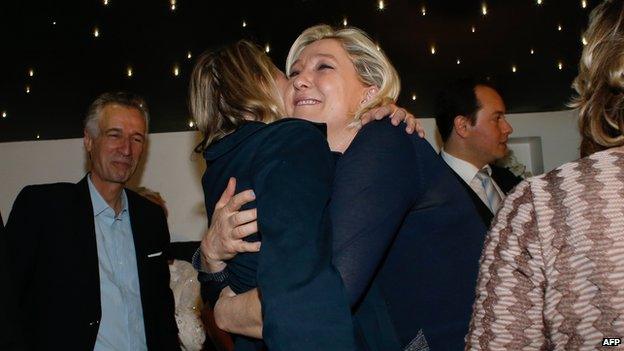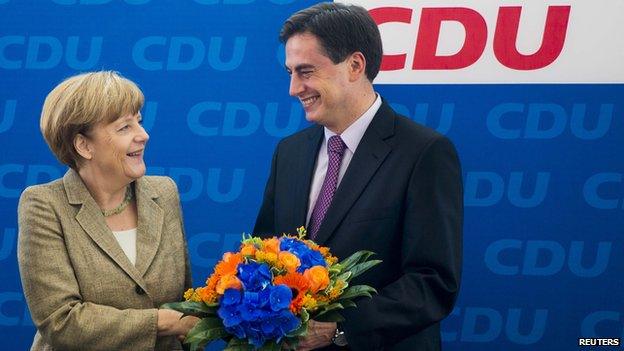Euro elections: The European revolt
- Published
- comments

The FN's Marine Le Pen celebrated an historic anti-EU victory in France
The revolt had been a long time brewing. The rising voices of discontent. The anti-austerity protests. The steady rise of Eurosceptic parties.
Even so, the shock could not be disguised when a stridently anti-EU party topped the poll in France. Only a short while ago the far right National Front (FN) was placed on the extremist fringe of French politics.
The French Prime Minister Manuel Valls did not try and explain away the result. He said it was "more than just a news alert... it is a shock, an earthquake."
It is all the more surprising when one remembers that France - along with Germany - is one of the principal architects of the European project. Now the FN's Marine Le Pen is claiming "a first step in a long march to liberty" away from the EU.
Impact of jobs crisis
So what has happened? The vote is, of course, in part a protest. The Socialist government is widely despised and unemployment remains stubbornly high. The French economy is stagnating.
Marine Le Pen has cleverly tapped into the frustration with globalisation and job insecurity.
She understands the fear of immigration, when nearly 26 million people are out of work in the EU.
It should also be pointed out that abstentions helped inflate the size of the FN victory.
Those fears resonated in countries like Denmark and Austria, where the far right polled strongly.
Certainly it was Europe's economic crisis which dominated the results from Greece.
The election was won by the radical left party Syriza. Its campaign was built around opposition to austerity and the bailouts, which it argued had caused a social catastrophe.
Its leader Alexis Tsipras said the "European leadership turned us into the guinea pigs of the crisis".
Yet considering the Greek economy has shrunk 26% in five years Syriza should probably have done better and the win is unlikely to threaten the governing coalition.

Chancellor Merkel maintained her dominant position in German politics
Italians back reform
Interestingly in Italy where Matteo Renzi, a new centre-left prime minister, is promising radical reform, the electorate gave him an astonishing 40% of the vote. The anti-establishment Five Star party of the comedian Beppe Grillo was pushed into a distant second place. Voters, it seems, are hungry for reform.
Even in Germany, which remains overwhelmingly committed to the EU, a relatively new Eurosceptic party, AfD, polled above 6% - but the party is not against the EU, but against the euro.
Turnout remained the same at a fraction over 43%. Despite spending funds to publicise the election, and despite promoting the idea that the vote was also to elect the President of the European Commission, the campaign did not engage the European voter.
So what will happen? The French president says "lessons have to be learned". Others say that 70% of lawmakers will be pro-EU and that they can continue setting the agenda. In any event the anti-establishment parties are unlikely to work together.
The markets certainly liked the result from Italy and the fact that these new anti- establishment parties were not in a position to threaten parliamentary business.
Europe is restless, impatient for growth and jobs. The mood is sour but not necessarily anti the idea of Europe itself.
So the battle lines are drawn. There are those who insist that the lesson of the election is that Europe must reform - which might mean doing less and returning some powers to the nation states. Others regard "ever-closer union" as manifest destiny and see the answer as lying in deeper integration.
But the German Foreign Minister, Frank-Walter Steinmeier, said today that the victory of the National Front sent a "severe" signal. "There is no doubt," he said, "that many populist, Eurosceptic and even nationalistic parties are entering the European Parliament."